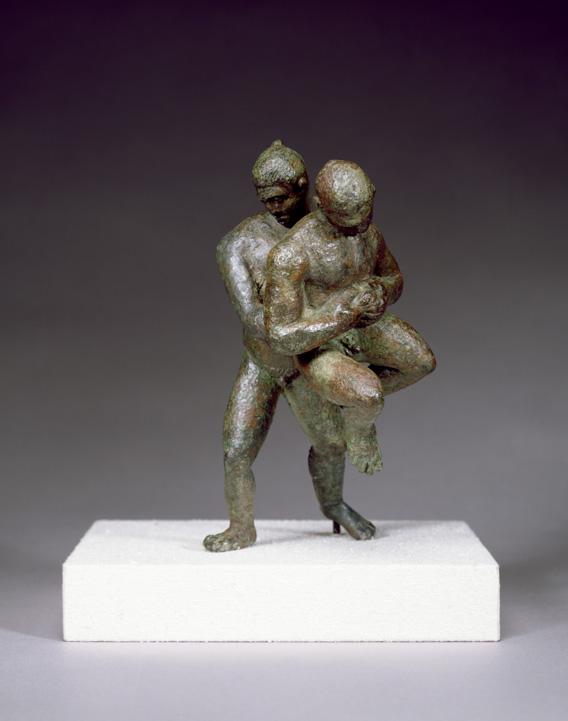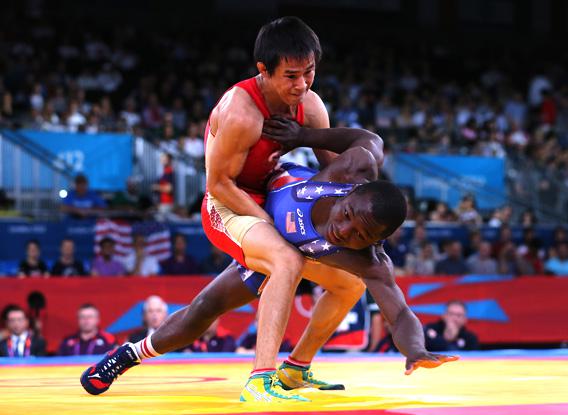Last month Sports Illustrated ran a story celebrating Olympic founder Pierre de Coubertin’s 150th birthday and his legacy, written by current head of the International Olympic Committee, Count Jacques Rogge. Rogge trumpets the Herculean effort put in by Coubertin and the values embodied in the Olympic Charter, and says that the IOC still operates by the values he laid out a century ago. Reading it the other day, certain lines have a different resonance than they might have just a few weeks ago. “Would Coubertin be happy with everything that has transpired since his death in 1937?” Rogge asks. “Of course not.” Well, add another posthumous disappointment to the list.
On Tuesday, the International Olympic Committee issued a press release announcing the 25 “core sports” they were recommending for the 2020 Olympics. They also revealed the eight “shortlisted sports” that were now “vying for inclusion.” Those eight? Baseball/softball, karate, roller sports, sport climbing, squash, wakeboarding, wushu—and wrestling. The IOC will decide in the spring which three of these sports to recommend for the 2020 games, and the IOC’s entire caucus will then convene in September to rule on which sports to approve in the final decision.

Acquired by Henry Walters, 1931
While partisans of wakeboarding and wushu were no doubt disappointed by the news, no one was as outraged as wrestling enthusiasts—and for good reason. Wrestling was not only featured at the first modern Olympics in 1896 (and at every summer Olympics since 1908) but was a major part of the ancient Olympics as well, going back to 708 B.C. (At the ancient games, it was both a standalone event and the culminating contest in the pentathlon.) And it’s not some provincial pastime that only the Greeks were fond of either: There’s evidence for wrestling across the ancient world—the activity shows up, for instance, in both the Epic of Gilgamesh and the Book of Genesis. Nearly every culture has some form of wrestling, from Bökh in Mongolia to Glima in Iceland. For a more recent example of how wrestling crosses cultures, consider that this week the Times of Israel ran an AP story datelined in Tehran about how devastated Iranians are about the potential loss of the Olympic sport. In Iran, wrestling is both the national sport and a symbol of ethical conduct and fairness. Meanwhile, a headline in wrestling hotbed Iowa read, “Worse than death.” As Missouri’s Brian Smith, college coach of 2008 Olympian Ben Askren said to me, “Name one issue where the U.S. and Iran would be on the same page: It’s wrestling.”
So what happened? The IOC has a list of 39 criteria under which they supposedly evaluated the core sports, grouped into the categories of reciprocal value, governance, tradition, universality, popularity, international development, and finance. As the University of Nebraska’s Bryan Snyder, coach of Olympic gold medalist Jordan Burroughs, said to me, “When you have a list of criteria, that should preclude the politics. Each sport could be evaluated on its merits.” But it’s hard to look at that set of criteria and conclude that wrestling failed to make the cut purely on those terms.
Wrestling has a list of affiliates in 177 countries and enjoyed sell-out crowds in the London games. As Jim Litke of the AP pointed out this week, the sport “generates twice the TV audience worldwide” of the modern pentathlon, an event many expected to be dropped, but which was spared from possible exclusion. As Litke notes, the vice president of the modern pentathlon’s governing body sits on the IOC board. (That vice president, Juan Antonio Samaranch Jr., is also the son of the late, long-serving IOC president.) The modern pentathlon was created by Pierre de Coubertin, founder of the modern Olympics, and so it, too, has some tradition on its side—just not the millennia of tradition that wrestling enjoys.
Did Samaranch save the modern pentathlon? Perhaps. Was badminton spared by the head of the 2020 Evaluation Committee, Sir Craig Reedie, a former doubles champion in the sport who is credited with bringing it to the Olympics just a couple decades ago? Did the presence on the IOC of Jim Easton, “CEO of the leading archery equipment company,” ensure that bows and arrows would be at the 2020 games? It’s impossible for an outside observer not to wonder about such things after the absurd decision regarding wrestling. The IOC, which includes sheiks, counts, dukes, princesses, and members of the Royal Order in addition to businessmen, has plenty of shady backroom politics in its past. As IOC member Richard Carrión of Puerto Rico told the AP, “Some people are better at lobbying than others.” Carrión added that “in a multi-national organization like this decisions get made in ways that are not completely logical.”
Olympic wrestling medalist Bill Scherr said this week that the international wrestling federation, FILA, “does no lobbying with the IOC, does not participate as a good citizen in IOC activities, and does not market itself.” And the IOC is certainly concerned with marketing. The same day that it released its statement about the “core sports” for 2020, it issued a separate press release about the strength of the Olympic brand. The “perception of the Olympic Games and the Olympic brand is very positive,” IOC president Jacque Rogge is quoted as saying in the release. “This trend is particularly evident among young people, which reflects the Games’ relevance in a highly fragmented global broadcasting market.” It’s possible that reps for other sports have been speaking this language better than the defenders of wrestling.
If so, then the proud sense of tradition many wrestlers and wrestling coaches feel could actually work against the efforts they may need to make to keep wrestling an Olympic sport. I spoke to my own former wrestling coach, Mark Faller, an Olympic alternate and coach of the 1984 Olympic gold medalists Ed and Lou Banach. “This move by the IOC will be the call that wakens a sleeping tiger,” he said. “Wrestling has always been blessed with an elegant level of underdeveloped recognition.” But he then expressed concern that wrestling might “transform into the pop culture attraction that it now competes against. God forbid,” he said.
I’m sympathetic to that noble-sounding sentiment, though it may not be the right strategy to engineer a reversal here. Barring serious reform of the IOC, wrestling partisans may need to speak its language. The wrestling community has already begun to campaign against the decision, and the head of FILA is meeting with Rogge to discuss the matter. While lovers of the sport consider their best tactics for survival, lovers of sport in general should once again consider the follies of the IOC.
